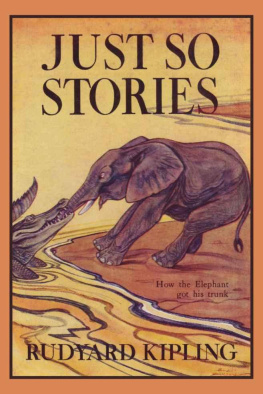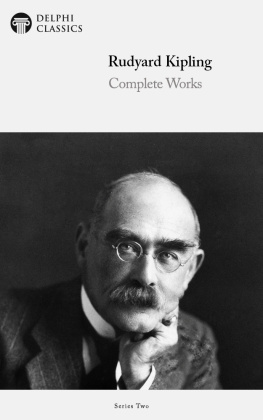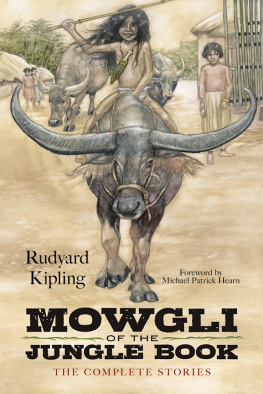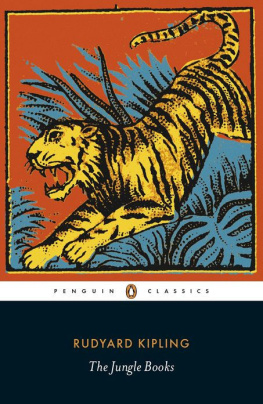Mark of the Beast
& Other Fantastical Tales
Rudyard Kipling
Fantasy Masterworks Volume 50
eGod
CONTENTS
ACKNOWLEDGEMENTS
Grateful acknowledgement is made to the following individuals for their help and inspiration in the compiling of this volume: Jo Fletcher, Mandy Slater, Peter Haining, Sara and Randy Broecker, Kim Newman and The Kipling Society ( www.kipling.org.uk ). Very special thanks to Mike Ashley.
Introduction: Neil Gaiman copyright September 2006.
The Vampire from The Vampire (1897).
The Dream of Duncan Parrenness from Civil and Military Gazette , December 25, 1884.
The City of Dreadful Night from Civil and Military Gazette , September 10, 1885.
An Indian Ghost Story in England from Pioneer , December 10,1885.
The Phantom Rickshaw from Quartette , December 1885.
The Strange Ride of Morrowbie Jukes from Quartette , December 1885.
The Unlimited Draw of Tick Boileau from Quartette , December 1885.
In the House of Suddhoo from Civil and Military Gazette , April 30, 1886.
The Bisara of Pooree from Civil and Military Gazette , March 4,1887.
Haunted Subalterns from Civil and Military Gazette , May 27, 1887.
By Word of Mouth from Civil and Military Gazette , June 10, 1887.
The Recurring Smash from Civil and Military Gazette , October 13,1887.
The Dreitarbund from Civil and Military Gazette , October 22, 1887.
Bubbling Well Road from Civil and Military Gazette , January 18,1888.
The Sending of Dana Da from The Weeks News , February 11, 1888.
My Own True Ghost Story from The Weeks News , February 25,1888.
Sleipner, Late Thurinda from The Weeks News , May 12,1888.
The Man Who Would Be King from The Phantom Rickshaw & Other Eerie Tales (1888).
The Solid Muldoon from The Weeks News , June 2, 1888.
Baboo Mookerjis Undertaking from Civil and Military Gazette , September 1, 1888.
The Joker from Pioneer , January 1, 1889.
The Wandering Jew from Civil and Military Gazette , April 4,1889.
The Courting of Dinah Shadd from Macmillans Magazine and Harpers Weekly , March 1890.
The Mark of the Beast from Pioneer , July 12 and 14, 1890.
At the End of the Passage from The Boston Herald , July 20,1890.
The Recrudescence of Imray from Lifes Handicap: Being Stories of Mine Own People (1891).
The Finances of the Gods from Lifes Handicap: Being Stories of Mine Own People (1891).
The Finest Story in the World from The Contemporary Review , July 1891.
Children of the Zodiac from Harpers Weekly , December 1891.
The Lost Legion from The Strand Magazine , May 1892.
A Matter of Fact from A Matter of Fact (1892).
The Bridge-Builders from Illustrated London News , Christmas Number, 1893.
The Brushwood Boy from Century Magazine , December 1895.
The Tomb of His Ancestors from Pearsons Magazine and McClures Magazine , December 1897.
Wireless from Scribners Magazine , August 1902.
They from Scribners Magazine , August 1904.
With the Night Mail: A Story of 2000 ADfrom Mclures Magazine , November 1905.
The House Surgeon from Harpers Magazine , September and October 1909.
The Knife and the Naked Chalk from Rewards and Fairies (1910).
In the Same Boat from Harpers Magazine , December 1911.
As Easy as A.B.C.: A Tale of 2150 ADfrom Family Magazine , February-March 1912.
Swept and Garnished from Pall Mall Magazine and Century Magazine , January 1915.
Mary Postgate from Nashs Magazine and Century Magazine , September 1915.
The Village That Voted the Earth Was Flat from A Diversity of Creatures (1917).
A Madonna of the Trenches from Pall Mall Magazine , September 1924.
The Wish House from Macleans Magazine , October 15, 1924.
The Gardener from McCallsMagazine , April 1925.
The Eye of Allah from McCalls Magazine and The Strand Magazine , September 1925.
On the Gate: A Tale of 16 from McCalls Magazine , June 1926.
The Appeal from Collected Verse (1939).
Afterword: Rudyard Kipling: A Life in Stories copyright Stephen Jones 2006.
Your Gods and my Gods
do you of I know which are the stronger?
Native Proverb
Years ago, back when I was just starting to write Sandman, I was interviewed, and in the interview I was asked to name some of my favourite authors. I listed happily and with enthusiasm. Several weeks later, when the interview had been printed, a fan letter arrived at DC Comics for me, and was forwarded to me. It was from three young men who wanted to know how I could possibly have listed Kipling as a favourite author, given that I was a trendy young man and Kipling was, I was informed, a fascist and a racist and a generally evil person.
It was obvious from the letter that they had never actually read any Kipling. More to the point, they had been told not to.
I doubt I am the only person who writes replies to letters in his head he never sends. In my head I wrote many pages in reply, and then I never wrote it down or sent it.
In truth, Kiplings politics are not mine. But then, it would be a poor sort of world if one were only able to read authors who expressed points of view that one agreed with entirely. It would be a bland sort of world if we could not spend time with people who thought differently, and who saw the world from a different place. Kipling was many things that I am not, and I like that in my authors. And besides, Kipling is an astonishing writer, and was arguably at his best in the short story form.
I wanted to explain to my correspondents why The Gardener had affected me so deeply, as a reader and as a writer its a story I read once, believing every word, all the way to the end, where I understood the encounter the woman had had, then started again at the beginning, understanding now the tone of voice and what I was being told. It was a tour de force. Its a story about loss, and lies, and what it means to be humanand to have secrets, and it can and does and should break your heart.
I learned from Kipling. At least two stories of mine (and a childrens book I am currently writing) would not exist had he not written.
Kipling wrote about people, and his people feel very real. His tales of the fantastic are chilling, or illuminating or remarkable or sad, because his people breathe and dream. They were alive before the story started, and many of them live on once the last line has been read. His stories provoke emotion and reaction at least one of the stories in this volume revolts me on a hundred levels, and has given me nightmares, and I would not have missed reading it for worlds. Besides, I would not have told my correspondents, Kipling was a poet, as much a poet of the dispossessed as he was a poet of Empire.
I said none of those things back then, and I wished that I had. So when Steve Jones asked me to write the introduction to this book, I said yes. Because Ive said them now, to you. Trust the tale, not the teller, as Stephen King reminded us. And the best of Rudyard Kiplings tales are, simply, in the first rank of stories written in the English language.
Enjoy them.











